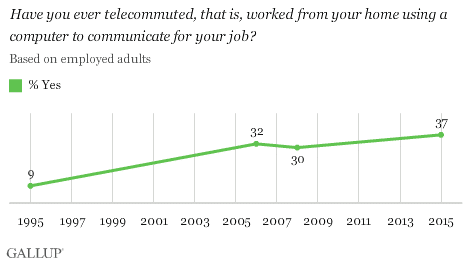
Why Remote Work Will Help Your Law Firm In Ways You Never Imagined
06/19/2018 By Bill4Time Staff

The amount of remote workers has steadily been increasing over the years now and there’s no reason why the legal industry can’t also follow suit. As shown in the below graph from Gallup.com.

Remote work has the potential to help law firms deliver better service to their clients by:
- Improving the productivity of their workers
- Attracting better qualified candidates due to being a strong job perk
- Collaborate more efficiently with team members
- Increasing employee dependability
- Reducing the money spent on in-office expenses
Take a moment to consider some of these opportunities for your firm, because despite the major paradigm shift for the modern law firm, remote work provides a major opportunity to better help serve your clients and your practice, if you’re flexible in how you choose to run your business.
1. No Distractions = Increased Productivity
Remote workers are able to pick their own environments that they know they’ll be productive in.
According to research, remote workers’ ability to be more productive boils down to them having the flexibility to work when they’re at their most productive as well as being able to put in extra hours when they need to and having a workspace where they know they won’t have to deal with any distractions.
2. Attract the Best Talent
Another benefit of remote work is that it’s seen as an attractive job perk and will aid you in bringing in top-tier talent.
Here are some reasons why candidates would be attracted to the idea of working remotely according to this article:
- They’re able to work wherever they’d like, whether that’s an office, a coworking space, cafe, etc.
- They save money because they don’t have to spend money on commuting to and from work each day, along with having to spend money on eating out and daily cups of coffee in the morning.
- Workers are free to work when they’d like as well being able to stop and take breaks when they need to and do tasks they couldn’t do at home like do yoga and cook up a quick meal.
- They value the sense of independence and want to work on their autonomous working abilities.
Richard Branson also recommends remote work for companies because it vastly increases the talent pool to choose from, anyone around the world is able to work a remote position while an in-office position limits its applicants to those in the area.
If you’re still in doubt, keep in mind that it’s not just small/solo law firms that are doing this, many of the larger, more traditional firms are also starting to adapt and offer remote opportunities.
3. Better Collaboration among your Team
A survey of remote workers found that 98% of respondents thought that working anywhere they choose boosted their levels of productivity, while 92% of respondents thought that video collaboration tools improved teamwork. Thanks to tools like Slack, Skype, Trello, and Bill4Time, collaborating with other team members is easier than ever before.
This graph from Remote.co details some of the collaboration tools that remote teams tend to use:

Here are some tips for making sure there aren’t any drops in your levels of collaboration when implementing a remote work program.
- Get your team accustomed to using any of your preferred software tools before you fully go remote so that you know they’re comfortable using the platforms before they head off on their own.
- Lay down clear expectations and guidelines for when they’re supposed to be available for communication.
- Have a trial period where you send out test messages during the times where they’re supposed to be logged in so that you’re assured that they’re living up to the arrangements.
- Let each team member know what their requirements are along with what you expect of them specifically.
- Keep reports of employees that aren’t working up to standards and let them know that their remote work perks may be taken away if improvements aren’t made.
4. Lower rates of Absenteeism
When many employees call in sick, they’re often not too sick to work, just to sick for the office.
Here are some stats regarding how remote work can reduce unscheduled absences pulled from this article:
- 78% of employees who call in sick, really aren’t. They do so because of family issues, personal needs, and stress.
- Unscheduled absences cost employers $1,800/employee/year; that adds up to $300 billion/year for U.S. companies.
- Teleworkers return to work more quickly following surgery or medical issues.
- Flexible hours allow teleworkers to run errands or schedule appointments without losing a full day.
- Organizations that implemented a remote work program, noticed a 63% reduction in unscheduled absences.
5. Less overhead costs
How much do you spend on overhead expenses?
According to this article, this is how much the average company spends on office space and in-office snacks:
- In-office snacks ($3,900 per year)
- Office space ($71,300 per month)
While the average business spends about $200 per person, the typical law firm spends about $1000 per person on supplies due to the nature of the legal industry.
Last thoughts
Although remote work may not be ideal for every law firm, the reasons above state why it does offer an opportunity for improvement.
If you do want to give it a shot, begin by offering your employees one day a week to work from home and track their progress. If they prove that they’re able to handle the situation, then move on to one full week a month then so on until you feel comfortable going fully remote.




